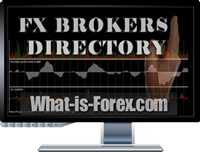What is a Forex Broker
What is a Forex Broker
A Forex broker works as the middleman between traders and market liquidity. A Forex broker may execute buy and sell orders on behalf of his clients charging a trading spread or/and a predefined trading commission.
Forex Brokers are divided into 2 major categories according to the way they execute orders: The Dealing Desk (DD) Forex Brokers and The No Dealing Desk (NDD) Forex Brokers.
(1) Dealing Desk Brokers (DD) or Market Makers
■ Market Makers
Market Makers Forex Brokers are trading on the opposite side of their clients. They charge fixed spreads and usually no trading commissions. This type of broker is ideal for Forex beginners.
» Market Makers / CFD Brokers Directory
(2) No Dealing Desk Brokers (NDD)
No-Dealing Desk Brokers are divided into ECN and STP Forex Brokers.
■ ECN Forex Broker
An ECN Forex broker is providing its clients with direct access to the global Forex market. ECN brokers charge variable spreads and sometimes trading commissions too. They are considered the most competitive of all Forex Brokers.
» ECN / STP Forex Brokers Directory
■ STP Forex Broker
An STP Forex Broker is passing its clients' orders directly to the liquidity providers. STP brokers are offering fixed spreads and sometimes they charge trading commissions too.
What is Fundamental Analysis
What is Fundamental Analysis
Fundamental analysis aims to validate the effect of various fundamental and macroeconomic developments on currency trading. Fundamentals include macroeconomic factors such is inflation, interest rates, unemployment, GDP, etc.
These are some important Fundamental Indicators.
- What is GDP (Gross Domestic Product)
GDP measures the change of the national income in an economy. GDP incorporates the values of all products and services that were produced during a particular period (usually 3-month or 1-year).
- What is GNP (Gross National Product)
GNP includes GDP plus income gained from investment and overseas work.
- What is Inflation
Inflation is measuring changes in the level of prices. Inflation is often called the hidden tax in an economy as it reduces the purchasing power of consumers. High inflation is bad news for the economy, the stock market, and the domestic currency rate. Inflation is measured on a monthly basis.
- What is the Personal Spending Indicator
A personal spending indicator measures the changes in individual spending in an economy. When personal spending is increased high growth and high inflation are the outcome and vice versa.
- What is Unemployment (%)
Unemployment is a macro-economic indicator that measures the level of the unemployed population in percentage to the total population who is able to work.
Forex Brokers Directory
Compare online brokers and trading system providers at What-is-Forex. Find information such is the company's regulation, trading terms, available platforms, current Forex promotions etc..








